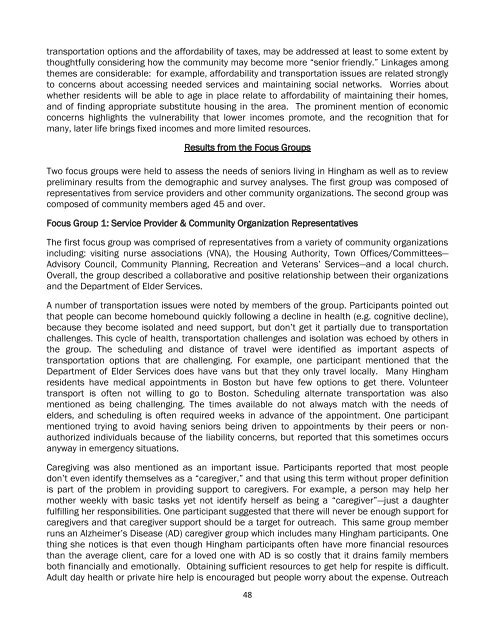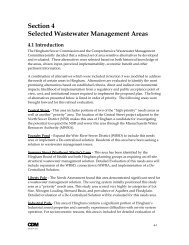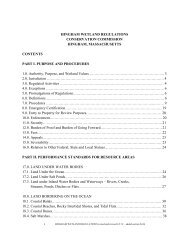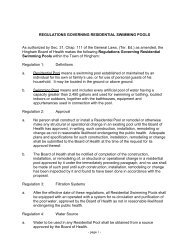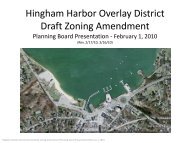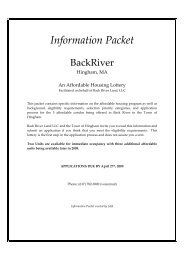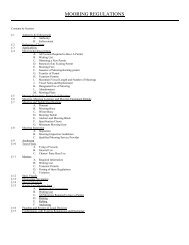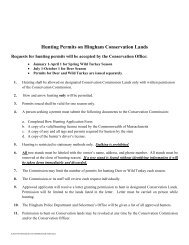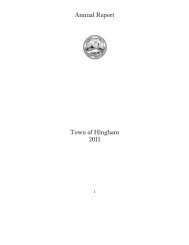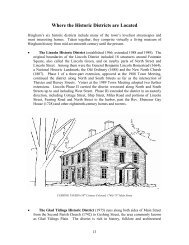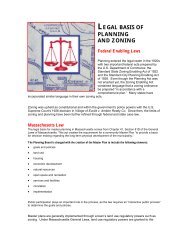Aging in Hingham - Town of Hingham Massachusetts
Aging in Hingham - Town of Hingham Massachusetts
Aging in Hingham - Town of Hingham Massachusetts
You also want an ePaper? Increase the reach of your titles
YUMPU automatically turns print PDFs into web optimized ePapers that Google loves.
transportation options and the affordability <strong>of</strong> taxes, may be addressed at least to some extent bythoughtfully consider<strong>in</strong>g how the community may become more “senior friendly.” L<strong>in</strong>kages amongthemes are considerable: for example, affordability and transportation issues are related stronglyto concerns about access<strong>in</strong>g needed services and ma<strong>in</strong>ta<strong>in</strong><strong>in</strong>g social networks. Worries aboutwhether residents will be able to age <strong>in</strong> place relate to affordability <strong>of</strong> ma<strong>in</strong>ta<strong>in</strong><strong>in</strong>g their homes,and <strong>of</strong> f<strong>in</strong>d<strong>in</strong>g appropriate substitute hous<strong>in</strong>g <strong>in</strong> the area. The prom<strong>in</strong>ent mention <strong>of</strong> economicconcerns highlights the vulnerability that lower <strong>in</strong>comes promote, and the recognition that formany, later life br<strong>in</strong>gs fixed <strong>in</strong>comes and more limited resources.Results from the Focus GroupsTwo focus groups were held to assess the needs <strong>of</strong> seniors liv<strong>in</strong>g <strong>in</strong> H<strong>in</strong>gham as well as to reviewprelim<strong>in</strong>ary results from the demographic and survey analyses. The first group was composed <strong>of</strong>representatives from service providers and other community organizations. The second group wascomposed <strong>of</strong> community members aged 45 and over.Focus Group 1: Service Provider & Community Organization RepresentativesThe first focus group was comprised <strong>of</strong> representatives from a variety <strong>of</strong> community organizations<strong>in</strong>clud<strong>in</strong>g: visit<strong>in</strong>g nurse associations (VNA), the Hous<strong>in</strong>g Authority, <strong>Town</strong> Offices/Committees—Advisory Council, Community Plann<strong>in</strong>g, Recreation and Veterans’ Services—and a local church.Overall, the group described a collaborative and positive relationship between their organizationsand the Department <strong>of</strong> Elder Services.A number <strong>of</strong> transportation issues were noted by members <strong>of</strong> the group. Participants po<strong>in</strong>ted outthat people can become homebound quickly follow<strong>in</strong>g a decl<strong>in</strong>e <strong>in</strong> health (e.g. cognitive decl<strong>in</strong>e),because they become isolated and need support, but don’t get it partially due to transportationchallenges. This cycle <strong>of</strong> health, transportation challenges and isolation was echoed by others <strong>in</strong>the group. The schedul<strong>in</strong>g and distance <strong>of</strong> travel were identified as important aspects <strong>of</strong>transportation options that are challeng<strong>in</strong>g. For example, one participant mentioned that theDepartment <strong>of</strong> Elder Services does have vans but that they only travel locally. Many H<strong>in</strong>ghamresidents have medical appo<strong>in</strong>tments <strong>in</strong> Boston but have few options to get there. Volunteertransport is <strong>of</strong>ten not will<strong>in</strong>g to go to Boston. Schedul<strong>in</strong>g alternate transportation was alsomentioned as be<strong>in</strong>g challeng<strong>in</strong>g. The times available do not always match with the needs <strong>of</strong>elders, and schedul<strong>in</strong>g is <strong>of</strong>ten required weeks <strong>in</strong> advance <strong>of</strong> the appo<strong>in</strong>tment. One participantmentioned try<strong>in</strong>g to avoid hav<strong>in</strong>g seniors be<strong>in</strong>g driven to appo<strong>in</strong>tments by their peers or nonauthorized<strong>in</strong>dividuals because <strong>of</strong> the liability concerns, but reported that this sometimes occursanyway <strong>in</strong> emergency situations.Caregiv<strong>in</strong>g was also mentioned as an important issue. Participants reported that most peopledon’t even identify themselves as a “caregiver,” and that us<strong>in</strong>g this term without proper def<strong>in</strong>itionis part <strong>of</strong> the problem <strong>in</strong> provid<strong>in</strong>g support to caregivers. For example, a person may help hermother weekly with basic tasks yet not identify herself as be<strong>in</strong>g a “caregiver”—just a daughterfulfill<strong>in</strong>g her responsibilities. One participant suggested that there will never be enough support forcaregivers and that caregiver support should be a target for outreach. This same group memberruns an Alzheimer’s Disease (AD) caregiver group which <strong>in</strong>cludes many H<strong>in</strong>gham participants. Oneth<strong>in</strong>g she notices is that even though H<strong>in</strong>gham participants <strong>of</strong>ten have more f<strong>in</strong>ancial resourcesthan the average client, care for a loved one with AD is so costly that it dra<strong>in</strong>s family membersboth f<strong>in</strong>ancially and emotionally. Obta<strong>in</strong><strong>in</strong>g sufficient resources to get help for respite is difficult.Adult day health or private hire help is encouraged but people worry about the expense. Outreach48


